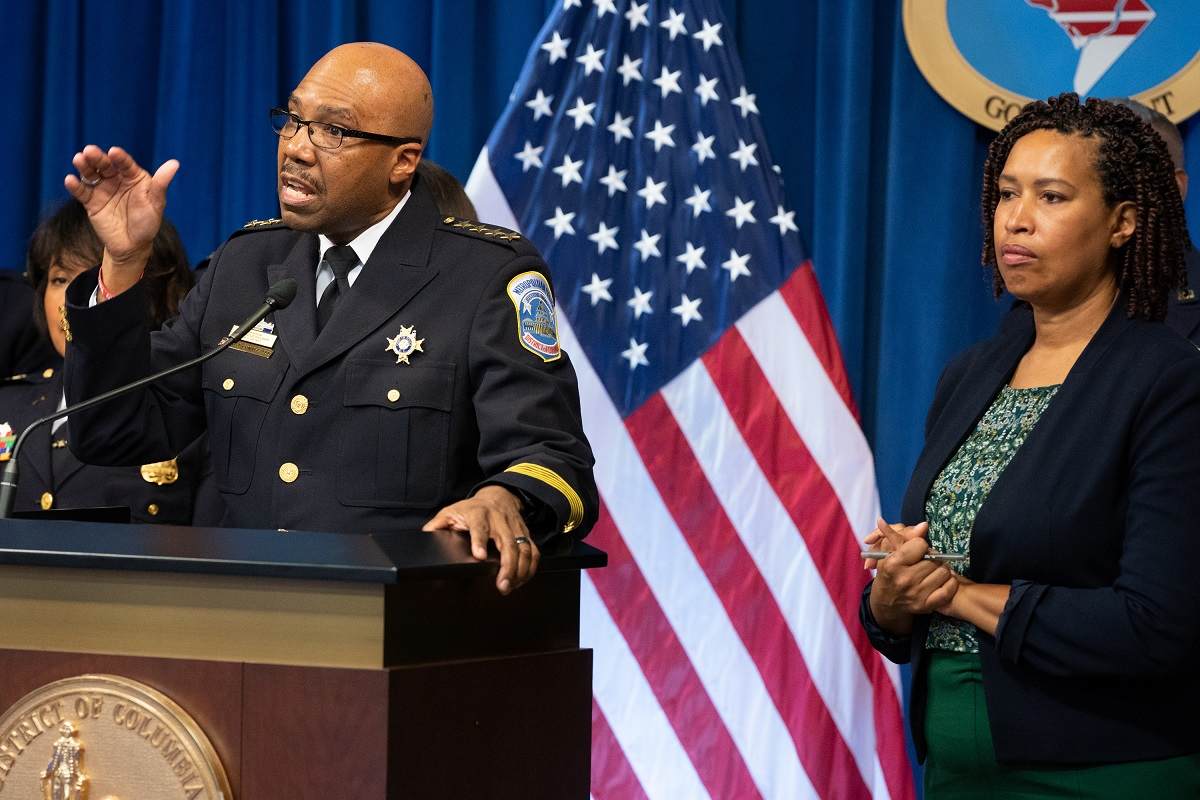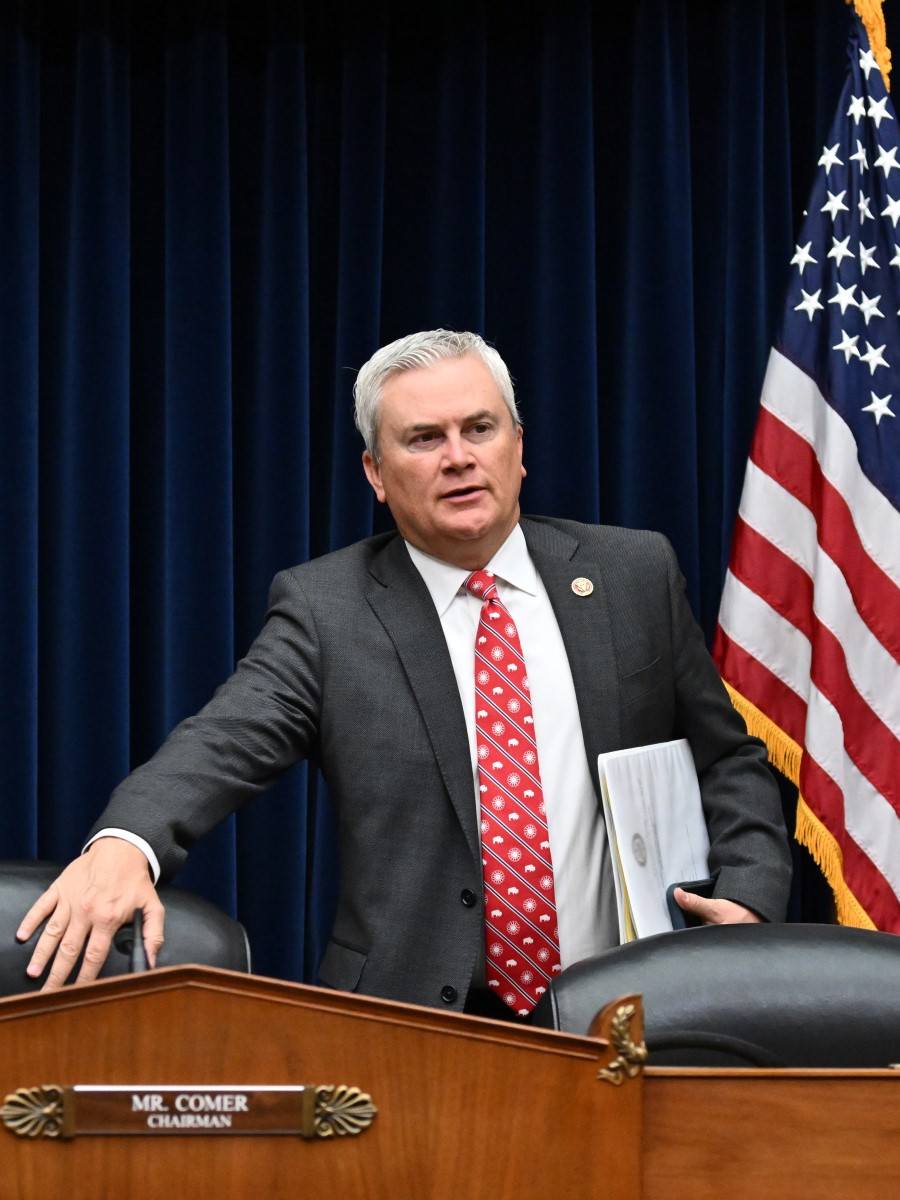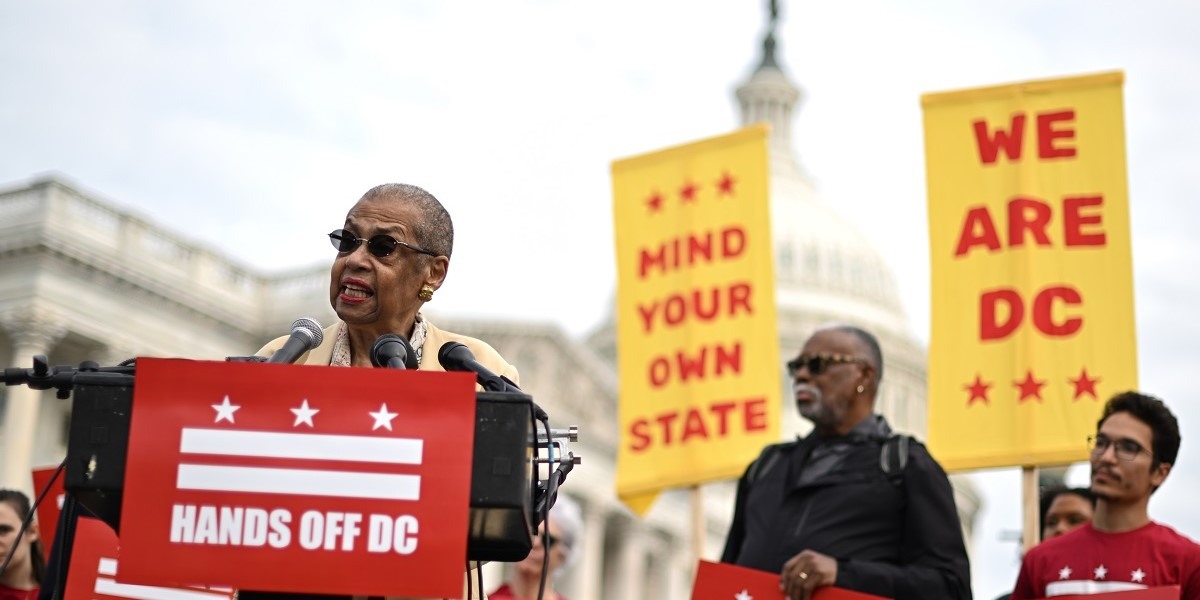
D.C. Mayor Muriel E. Bowser and police chief Robert J. Contee III in April.
16:39 JST, May 17, 2023
WASHINGTON – Congress has voted to reject D.C.’s police accountability legislation, the second time this year that a D.C. bill has been swatted down on Capitol Hill. But President Biden has already threatened to veto the measure disapproving of the policing bill, making Tuesday’s action largely symbolic.
The Senate vote took place just as Mayor Muriel E. Bowser (D) and other city leaders departed a House Oversight Committee hearing across the street, where Republicans grilled them about crime and public safety. The back-to-back congressional actions in both chambers underscored the thorny environment the District must contend with in Congress this year – and at a critical time for the mayor and D.C., as she seeks to revitalize downtown and quell violent crime, issues she asked members of Congress on Tuesday to work with her to address.
The disapproval resolution passed by a vote of 56 to 43. Eight senators – six Democrats and two independents who caucus with them, Kyrsten Sinema of Arizona and Angus King of Maine – joined Republicans in voting to block D.C.’s Comprehensive Policing and Justice Reform Amendment Act, legislation crafted in the aftermath of George Floyd’s killing at the hands of Minneapolis police. The policing legislation, most of which has already been in effect on a temporary basis, restricts certain policing tactics, prevents the hiring of officers with past misconduct and expands public access to police disciplinary records and body-camera footage in excessive force incidents, among other things. The GOP-controlled House voted to reject the legislation last month.
While the vote’s impact – considering Biden’s veto threat – will probably be much more political than practical, the message is clear: D.C. may continue to have a rocky ride for the next year and a half in Congress, weathering its most aggressive oversight in years.
House Republicans have been eager to use their constitutional authority to scrutinize policies in the deep-blue city – especially on the issues of crime and public safety, as was on display in Tuesday’s hearing.
“What we saw here was an ideological back-and-forth, a partisan kind of mash-up,” Bowser told reporters after the hearing, which came the same day that the D.C. Council took its first of two votes on the city’s nearly $20 billion budget. “I’m sitting here thinking, my council right now is voting on my budget that has a real impact on how people in Washington, D.C., live every single day.”
***
D.C.’s day in the crosshairs began Tuesday morning with the Oversight Committee.
Bowser sought to balance decrying D.C.’s lack of autonomy while also expressing a commitment to crack down on violent crime, at times agreeing with Republicans about increasing police recruitment. Outgoing D.C. Police Chief Robert J. Contee III and City Administrator Kevin Donahue joined Bowser. And U.S. Attorney for the District of Columbia Matthew Graves, who uniquely functions as D.C.’s local prosecutor, appeared for testimony as well – and was peppered with repeated questions and criticism about his office’s low prosecution rate of local arrests.
While crime is nowhere near the levels of the 1980s and ’90s, during the crack cocaine epidemic, the District is experiencing challenges, namely with rising homicides and carjackings. City leaders have observed that D.C. is not the only large American city facing issues with crime, a point Bowser made at the hearing as well.

Rep. James Comer (R-Ky.), chairman of the House Oversight Committee, arrives at a hearing on issues related to the District of Columbia on Capitol Hill in Washington, D.C., on May 16, 2023
But even as some Republicans on the committee pummeled city officials with declarations that the city is unsafe, Bowser and House Oversight Committee Chairman James Comer (R-Ky.) took a conciliatory approach to kick off the hearing. They started off by expressing agreement on areas including reducing crime and bringing more federal workers back to the office in person in D.C. and in general.
Bowser detailed a number of actions the District is taking in response to increasing crime, and she asked the committee to work with her. At the same time, Bowser described the unique challenges the city’s criminal justice system has faced because D.C. is not a state; the federal government controls and funds much of D.C.’s justice system – such as its prosecution of almost all local crimes.
“I won’t be making any excuses here. I’m the mayor, and I’m responsible for making this very complicated, unique system work for my residents, businesses and all Americans,” Bowser said, before describing public safety legislation she proposed the day before that is intended to enhance penalties for certain violent crimes and give judges more discretion to detain people with a violent criminal history.
Comer lauded the bill, noting he had met with Bowser last week to talk about how they could work together – eschewing the kind of adversarial boxing matches that have historically characterized the city’s strained relationship with Congress. Comer expressed interest in taking a closer look at Congress’s budget rider prohibiting the District from taxing and regulating recreational marijuana, something D.C. has been advocating to remove for years, as well as assisting D.C. in bringing a new arena to the city at RFK Stadium – one of Bowser’s big agenda items.
Even Rep. Paul A. Gosar (R-Ariz.), a far-right lawmaker who has sparred with District officials in the past, thanked the mayor for her approach. “Kudos – great attitude!” he said, before launching into a line of questioning about coronavirus vaccines.
Del. Eleanor Holmes Norton (D-D.C.) said after the hearing that it was less contentious than she expected, and Comer’s offers to help “surprised but elated” her. “I’ll be following up on that,” she said.
Crime has been a particular focus among Oversight Committee Republicans, who have frequently depicted the nation’s capital as unsafe for visitors and residents – or even Capitol staff members and lawmakers, some of whom have been victims in recent assaults. “Washington, D.C., clearly has a crime crisis,” Comer said in his opening statement, before lambasting the D.C. Council and some of its recent criminal justice legislation while once again thanking Bowser for opposing some of the bills, such as the revised criminal code, which Congress previously blocked.
Rep. Jamie Raskin (D-Md.), speaking to Bowser, pointed out that there appeared to be “an effort to drive a wedge between you and the D.C. Council,” before Bowser reiterated that she and the council are united against congressional intervention in D.C. affairs.
Raskin frequently steered the conversation toward what he said the committee should be addressing instead of “micromanaging” D.C., including gun violence, and compared the committee’s criticism of D.C. to President Donald Trump “blaming the victim” after a civil jury found he sexually abused E. Jean Carroll.
“They’re part of an effort to deny Americans who live in Washington the right to participate in representative government – and then blame them for their own disenfranchisement and lack of representation in Congress,” Raskin said.
While Bowser and Comer appeared to project a positive rapport, no congressional oversight hearing of D.C. would be complete without at least one Republican questioning whether the Founders ever wanted D.C. to be a state and launching into a philosophical debate with the mayor.
Calling Bowser an “intelligent American,” Rep. Clay Higgins (R-La.) questioned whether Bowser was familiar with the Founders’ debate over the nation’s capital and asked if she knew of “any other municipality in these United States that has access to our seat of government as the citizens of Washington, D.C.?”
“Actually, they all have more access because they have voting members of Congress,” Bowser said, as D.C. residents advocating for statehood clapped in the crowd.

Del. Eleanor Holmes Norton (D-D.C.) and D.C. statehood activists at a news conference outside the U.S. Capitol in Washington, D.C., on May 16, 2023.
***
But many members of the committee saved their more critical comments for Graves, who took a consistent verbal hammering by members of the committee – with Rep. Marjorie Taylor Greene (R-Ga.) formally introducing articles of impeachment against him. The U.S. attorney’s office declined to comment on the move, while the Department of Justice issued a statement in support of Graves and his work.
The Republican representatives repeatedly used their five minutes of airtime to lambaste the top prosecutor, pointing to data that showed his office had chosen last year not to prosecute 67 percent of those arrested by police officers in cases that would have been tried in D.C. Superior Court and accusing him of “soft-on-crime” policies that made the nation’s capital dangerous. They also cited a statistic oft-referenced by the city’s police chief, who said that the average homicide suspect had been arrested 11 times before that charge.
“Mr. Graves, bro, you need to do your job,” said Rep. Byron Donalds (R-Fla.).
Graves defended his office’s performance, saying in fiscal year 2022, his office charged 90 percent of all arrests for the most serious violent crimes. He said most of the decrease in prosecution rates came from nonviolent misdemeanor cases.
The top prosecutor also attributed the drop in the percentage of cases charged to fallout from the pandemic and the Department of Forensic Science’s loss of accreditation. At the city’s public safety summit last week, Bowser criticized Graves for placing blame on the forensic department and urged him to use federal resources to fill in the gaps. One representative at the hearing similarly pressed him to use other crime labs.
Graves said his office’s charging rates for this fiscal year, so far, are higher than last year’s. “We understand that dealing with these issues requires a whole-of-government response,” Graves said, referencing increases in homicides and carjackings in the District. “We recognize that prosecution is an important part of that response.”
But other Republicans joined Comer in expressing interest in providing D.C. with more resources, namely within the criminal justice system. Rep. Kelly Armstrong (R-N.D.) said that if the District needed more resources to hire prosecutors or make improvements at the jail, Congress should be able to help. The mayor and U.S. attorney eagerly embraced those ideas.
In more than three hours of testimony, Contee was rarely questioned. The police chief was most active in a line of questioning about firearms. He said a “significant percentage” of crimes in D.C. involve guns, and that most of those weapons have come from states south of the District.
***
The Senate voted to reject D.C.’s policing bill almost immediately after the House hearing ended. The Senate vote was also highly unusual: The 60-day congressional review period under the D.C. Home Rule Act expired last week. D.C. Attorney General Brian Schwalb (D) issued a formal opinion Tuesday saying that the vote “has no legal consequence for the validity of the law, and is nothing more than empty political grandstanding.”
Because of Biden’s veto threat, however, it may end up being a moot point. A White House official said Tuesday that Biden still intends to veto the disapproval resolution.
Still, even despite the blunted practical impact of the vote, the fact that Congress successfully blocked two consecutive pieces of D.C. criminal justice legislation is incredibly rare in the grander scheme of D.C.’s 50-year history of limited home rule. Until this Congress, only three other disapproval resolutions had succeeded in those 50 years.
Republicans have said they intend to use D.C. to make national statements about the need to be tough on crime, leading local officials to call on them to stop using D.C. as a “political football.” Already, the House and Senate campaign arms have gone after Democrats for siding with D.C., showing how Republicans could use these votes as a cudgel in campaign season.
The National Republican Senatorial Committee, for example, said Sen. Tim Kaine (D-Va.) wouldn’t “stand up to Democrats’ anti-police agenda.” Kaine said he voted against blocking the D.C. policing bill “because making sure police are accountable to the communities they serve helps create a safer city for the many Virginians who commute to D.C. for work every day,” adding he is a “strong supporter” of statehood.
The six Democrats who voted to reject the D.C. policing bill were: Sens. Jacky Rosen and Catherine Cortez Masto of Nevada, Jon Tester of Montana, Jeanne Shaheen and Maggie Hassan of New Hampshire and Joe Manchin III of West Virginia.
Ahead of the Senate vote, Norton joined statehood advocates with the “Hands Off DC” coalition outside the U.S. Capitol and derided congressional interference in the District’s affairs. D.C.’s residents, she said, should be allowed to govern themselves.
“House Republicans say instead that D.C. residents, a majority of whom are Black and Brown, are incapable and unworthy of the same respect afforded to residents of their own districts,” she said, later adding: “I will continue to do everything within my power to ensure Congress keeps its hands off D.C.”
Top Articles in News Services
-

Survey Shows False Election Info Perceived as True
-

Hong Kong Ex-Publisher Jimmy Lai’s Sentence Raises International Outcry as China Defends It
-

Japan’s Nikkei Stock Average Touches 58,000 as Yen, Jgbs Rally on Election Fallout (UPDATE 1)
-

Japan’s Nikkei Stock Average Falls as US-Iran Tensions Unsettle Investors (UPDATE 1)
-

Trump Names Former Federal Reserve Governor Warsh as the Next Fed Chair, Replacing Powell
JN ACCESS RANKING
-

Producer Behind Pop Group XG Arrested for Cocaine Possession
-

Japan PM Takaichi’s Cabinet Resigns en Masse
-

Man Infected with Measles Reportedly Dined at Restaurant in Tokyo Station
-

Israeli Ambassador to Japan Speaks about Japan’s Role in the Reconstruction of Gaza
-

Videos Plagiarized, Reposted with False Subtitles Claiming ‘Ryukyu Belongs to China’; Anti-China False Information Also Posted in Japan





















